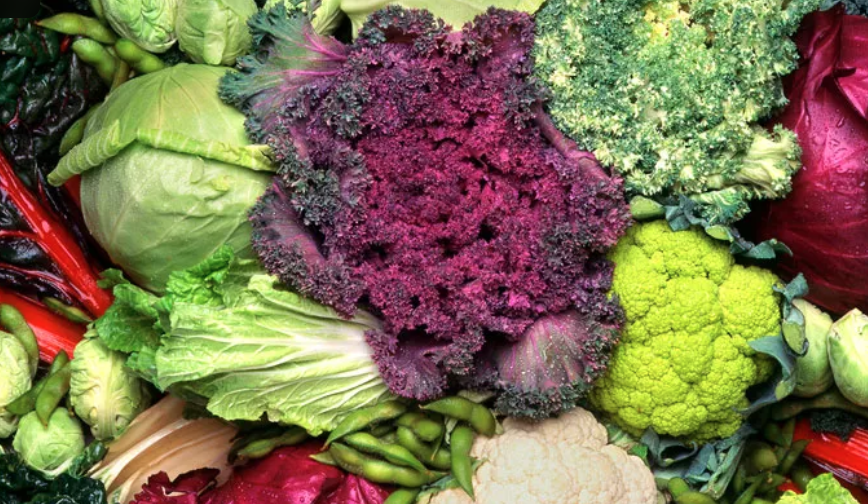
Cancer is one of the leading causes of death worldwide, and many are looking for ways to lower their risk. While no single food can completely prevent cancer, scientific research has shown that certain vegetables, particularly those from the cruciferous family, may offer powerful protective benefits. These vegetables are packed with nutrients and compounds that can help the body fight cancer at its earliest stages.
What Are Cruciferous Vegetables?
Cruciferous vegetables belong to the Brassica family and include popular choices like:
- Broccoli
- Cauliflower
- Cabbage
- Brussels sprouts
- Kale
- Bok choy
- Arugula
- Radishes
These vegetables are rich in essential nutrients, including fibre, vitamins C, E, and K, folate, and minerals such as potassium. But what makes them truly remarkable are the unique cancer-fighting compounds they contain.
Cancer-Fighting Compounds in Cruciferous Vegetables
Several key compounds in cruciferous vegetables have been shown to protect against cancer:
1. Glucosinolates
Cruciferous vegetables are rich in glucosinolates, sulfur-containing compounds that break down during digestion into biologically active chemicals, such as indoles, nitriles, and isothiocyanates. These chemicals have been studied extensively for their anti-cancer properties.
- Isothiocyanates, like sulforaphane, are particularly potent. They help neutralize carcinogens, protect cells from DNA damage, and promote apoptosis (programmed cell death) in harmful cells.
- Indole-3-carbinol is another compound found in these vegetables that helps regulate hormones and can lower the risk of hormone-sensitive cancers like breast and prostate cancer.
2. Antioxidants
Cruciferous vegetables are packed with antioxidants that help protect the body’s cells from oxidative stress, which can lead to DNA mutations and cancer development. Antioxidants such as vitamin C, vitamin E, and carotenoids found in these vegetables play a crucial role in scavenging harmful free radicals.
3. Anti-inflammatory Properties
Chronic inflammation is linked to cancer progression, and many cruciferous vegetables have anti-inflammatory properties. Compounds like sulforaphane found in broccoli can inhibit the release of inflammatory molecules, potentially reducing the risk of cancer.
How Cruciferous Vegetables Help Prevent Cancer
Research indicates that regular consumption of cruciferous vegetables can lower the risk of several types of cancers, particularly cancers of the digestive tract, lungs, and breasts. Here’s how they work:
1. Detoxification of Carcinogens
Sulforaphane, found in high amounts in broccoli and other cruciferous vegetables, has been shown to enhance the body’s natural detoxification process. It helps enzymes in the liver break down and eliminate potential carcinogens before they cause any harm.
2. Protection from DNA Damage
The compounds in cruciferous vegetables can help protect cells from oxidative stress, one of the primary causes of DNA damage. By neutralizing free radicals, these vegetables can prevent the mutations that can lead to cancer development.
3. Hormonal Balance
Indole-3-carbinol, found in vegetables like broccoli and kale, helps regulate estrogen levels in the body. By balancing hormone levels, it reduces the risk of hormone-related cancers, such as breast, uterine, and ovarian cancers.
4. Apoptosis of Cancer Cells
Cruciferous vegetables promote apoptosis, the process by which damaged or dangerous cells self-destruct. This is particularly important in the fight against cancer, as it helps the body eliminate cells that have the potential to turn cancerous.
5. Anti-Angiogenesis
Angiogenesis is the process by which tumours develop new blood vessels to grow. Cruciferous vegetables contain compounds that can inhibit angiogenesis, effectively cutting off the blood supply to cancer cells and preventing tumour growth.
Best Ways to Consume Cruciferous Vegetables
To maximize the cancer-fighting benefits of cruciferous vegetables, it’s important to prepare them in ways that preserve their nutrient content.
- Eat Them Raw: Raw cruciferous vegetables, especially broccoli, contain higher levels of sulforaphane, a potent anti-cancer compound.
- Lightly Steam: Steaming is one of the best methods for preserving the cancer-fighting compounds while still making the vegetables easier to digest.
- Add to Salads or Smoothies: Mix raw cruciferous vegetables like kale, arugula, and radishes into salads, or add a handful to a smoothie for an easy nutrient boost.
- Fermented Options: Fermented cabbage (sauerkraut) or other fermented cruciferous vegetables also offer health benefits, including cancer protection and better gut health.
Scientific Evidence Supporting Cruciferous Vegetables
Several studies have supported the role of cruciferous vegetables in cancer prevention:
- Breast Cancer: A study published in the Journal of the National Cancer Institute found that women who ate more cruciferous vegetables had a lower risk of developing breast cancer. Sulforaphane, in particular, was shown to inhibit the growth of breast cancer cells.
- Lung Cancer: According to research by the National Cancer Institute, people who consumed large amounts of cruciferous vegetables had a significantly lower risk of lung cancer, especially among smokers.
- Colorectal Cancer: Studies have consistently shown that consuming cruciferous vegetables is associated with a reduced risk of colorectal cancer, thanks to their ability to detoxify harmful substances and reduce inflammation in the digestive tract.
Conclusion
While no single food can offer complete protection from cancer, cruciferous vegetables provide a powerful defence. Their unique combination of glucosinolates, antioxidants, and anti-inflammatory properties makes them one of the best choices for those looking to lower their cancer risk. Incorporating a variety of these vegetables into your daily diet can be a simple yet effective strategy for supporting long-term health and reducing your chances of developing cancer.
